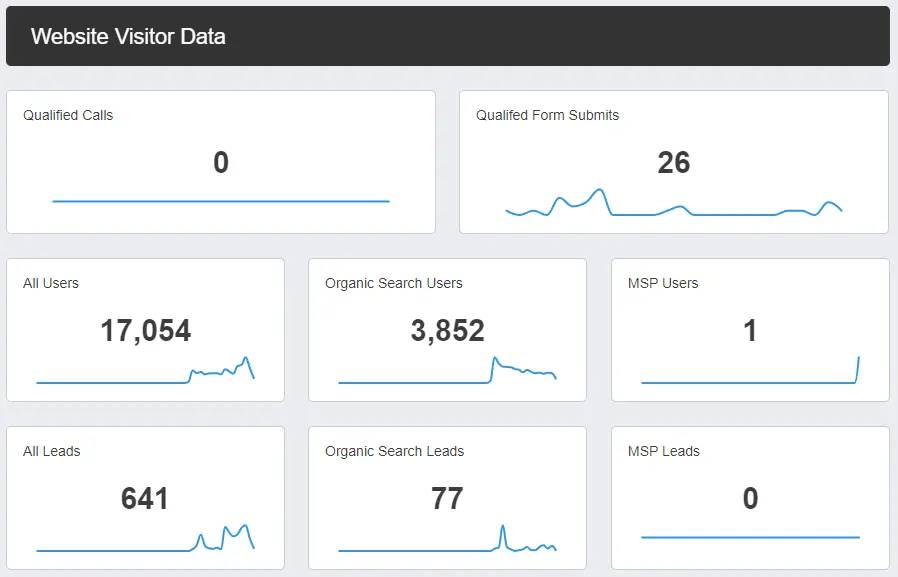Questions Business Owners Should Ask About Their Website

In the dynamic world of digital marketing, it’s crucial for business owners to continuously evaluate their website’s effectiveness. This article explores essential questions you should be asking about your website. From lead generation to cyber security, we delve into various aspects that determine your site’s success and impact in the digital marketplace. Join us as we unravel these pivotal queries to help you optimize and secure your website for optimal performance.
Is Our Site Driving Leads or Business Opportunities?
In business, leads and opportunities represent different stages in the sales process.
A lead is an individual or organization that shows interest in your product or service, but their potential to become a paying customer is not yet confirmed. In contrast, a business opportunity is a lead that has been evaluated and deemed to have a higher likelihood of converting into a sale.

To effectively manage these stages, businesses should implement a system to qualify leads. This involves setting criteria that differentiate a general inquiry from a potential sales opportunity. For example, a qualified lead might be one that matches the target market, has the budget and authority to make a purchase, and has expressed a specific need that the product or service can fulfill.
Once a lead is qualified, it should be passed on to the sales team. This handover is crucial, as the sales team focuses on nurturing these qualified leads, guiding them through the sales funnel towards a closed deal.
CRM systems like Salesforce, HubSpot, or Zoho CRM are instrumental in this process. They help businesses track and manage leads, score them based on predefined criteria, and facilitate the smooth transition of qualified leads to the sales team for focused engagement and closure.
Is My Website Safe From Cyber Attacks
In today’s digital landscape, safeguarding your website from cyber threats is vital. To ensure safety, business owners should routinely verify that their website is regularly backed up. This is fundamental for data recovery in case of cyber-attacks or technical malfunctions.
- Next, you should ask what is the backup frequency and volume: Ascertain the number of backups available and how often they are created. Frequent backups help minimize the risk of significant data loss.
- Also, what is the restoration process: Familiarize yourself with the procedure for data restoration from backups. Know whom to contact in case of data loss or website downtime.
- Furthermore, inquire if your backups are stored offsite: Backups should ideally be stored offsite to provide an additional layer of security and safeguard against onsite data threats.
For business owners, having clear, actionable plans for these aspects is key to ensuring a robust defense against cyber incidents.
Does my website offer a good experience
In creating a positive website experience, it is important for business owners to focus on three key areas:
- The first key area is website speed optimization: Benchmark your website's loading speed against competitors using tools like Google's PageSpeed Insights. Analyze your site’s performance and pinpoint areas that can be improved.
- Furthermore, always remember that Content is Still King! The quality of your content needs to be detailed, specific content that facilitates a seamless user journey. Aim to eliminate barriers, guiding visitors towards becoming leads through calls, form submissions or emails.
- Another important aspect that gets taken for granted is uptime monitoring. Most providers claim a 99.9% uptime guarantee. But how do you know if your site goes down in the middle of the night? Use uptime checkers like Uptime Robot for constant site monitoring. Quick detection of downtime allows for immediate action, ensuring a steady user experience.
Prioritizing these elements is crucial in providing a user-friendly, efficient, and compelling online presence.
Does My Site Stand Out
Ensuring your website stands out from your competitor’s website can be a monumental task. In an effort to stand above the competition, consider utilizing a Unique Selling Proposition (USP).
Identify and prominently feature your USP across your website. This is what sets your business apart from competitors, be it in quality, service, price, or innovation.
Moreover, when presenting your products or services, consider crafting product descriptions from the customer’s perspective. Focus on the value and benefits the product brings, rather than just its specifications. Also, if your product or service is of exceptional quality, clearly explain why, emphasizing its superiority. Lastly, distinguish your offerings from competitors. While similar to your Unique Value Proposition (UVP), this is your chance to specifically showcase how your products or services stand out, not just your company overall.
Does My Website Appear Trustworthy
Google utilizes EEAT guidelines (Experience, Expertise, Authoritativeness, and Trustworthiness) when ranking websites in the SERPs. Enhancing website trustworthiness involves:
To increase your websites trust, it is crucial to include the EEAT principles in your content and design, showcasing your business's credibility and expertise.
Another way to enhance trust is to use Trust Icons: Display trust icons, such as security badges or accreditations, to reassure visitors of your website’s legitimacy and safety. Also, feature customer reviews and testimonials to provide social proof, building confidence in potential customers through the positive experiences of others.
These elements collectively strengthen the trustworthiness of your website, encouraging engagement and conversions.
In conclusion, navigating the complexities of a website’s performance requires a strategic approach. As we’ve explored, key areas like lead conversion, cybersecurity, user experience, uniqueness, and trustworthiness play critical roles in the success of your online presence. Regularly questioning and improving these elements can lead to a robust, engaging, and secure website, ultimately driving business growth. Stay ahead by continually assessing and adapting to these vital aspects of your digital footprint.
About the Author
Mark Itzkovitz
Owner
Digital marketing agency founder with 18+ years experience. Former IT expert turned marketing strategist for MSPs and IT providers. Combines tech knowledge and marketing skills to deliver lead generation solutions for business owners.
